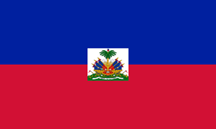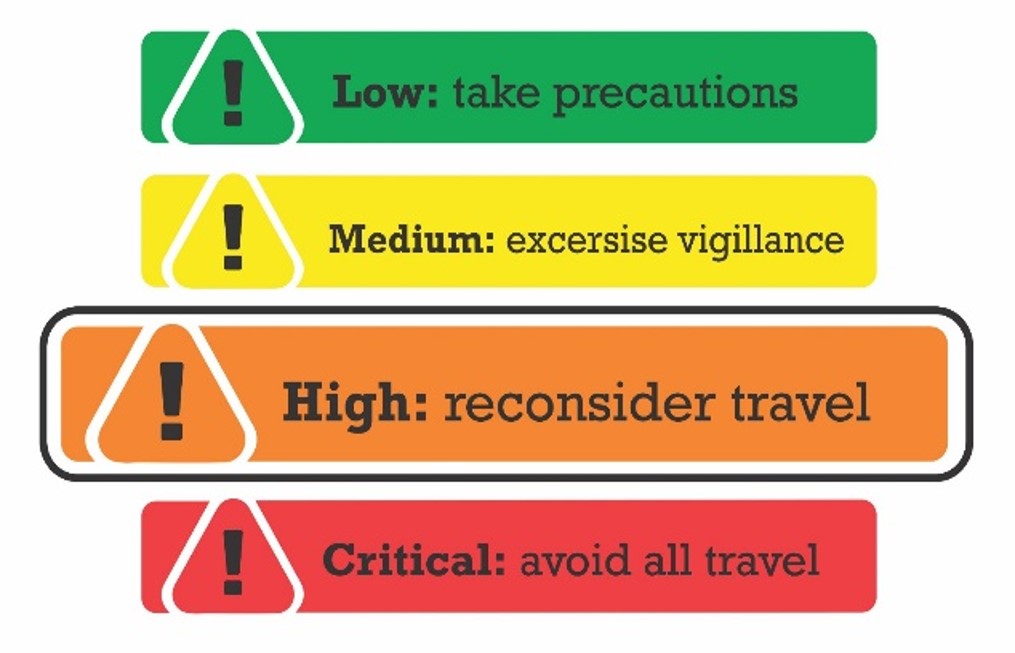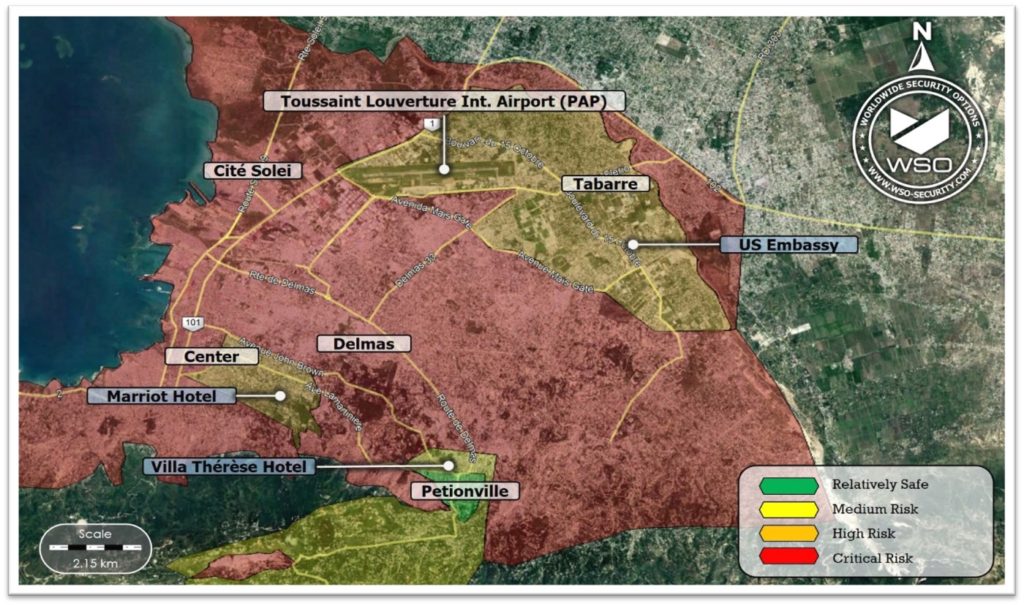| Official Name: | Republic of Haiti |
| Official Language: | French, Haitian Creole |
| Area: | 27,750 km2 (10,710 sq mi) |
| Population: | 11,123,180 |
| Time Zone: | UTC−5 |
| Capital City: | Port-au-Prince |
| Elevation (Port-au-Prince): | 15 m (49 ft) |
| Currency: | Gourde (HTG) |
| Main Cities: | Port-au-Prince, Port-de-Paix |
| Main Port: | Port-au-Prince |
| Required vaccination for entry: | None |
| Required visa to entry: | Nationals from Canada, EU countries, and the UK and others DO NOT require visas. All travelers must pay 10 USD upon entry. Click here for more information concerning visa requirements. |

Main Risks:
Theft, robbery, kidnapping, extortion, rape, drug and human trafficking, fraud, vehicle assault.
Executive Summary
Haiti features high risks. Security risks increase considerably in neighborhoods removed from relatively safe areas. Haiti is one of the most underdeveloped countries in the Western hemisphere, so public infrastructure is lacking. Risks posed by political violence and crime are the main threat to foreign visitors. We strongly recommend procuring secure transportation for all types of travel. Procure executive protection services for business and/or high-profile itineraries.

General Risk Level: HIGH.
The risk is stable throughout the country. It is not advised to travel through the countryside. From a security standpoint, it is essential to remain within the relatively safe areas of Port-au-Prince, especially if secure transportation and/or executive protection services are unavailable. Local security forces are not deemed reliable. It is thus necessary to review security considerations before traveling to Haiti, preferably under professional supervision.

Crime and Security
Haiti features high rates of crime and is considered one of the most violent countries in the Americas. These conditions are worsened by nationwide underdevelopment and poverty. Low and medium-level crime is the main threat to foreign visitors in the country, especially beyond Petionville, a relatively safe neighborhood in the outskirts of Port-au-Prince. Petionville houses the upper classes and foreign diplomatic personnel, so the area is better protected by security forces and private elements. That said, keep in mind that even relatively safe sites are vulnerable to witnessing violence. Taking into account the risks posed by crime, it is essential to avoid non-essential travel to the countryside, including beachside areas. Only Labadle is relatively safer because the locale is administered by an important cruise line company. Foreigners are likely targets for criminals due to perceptions of wealth. For these reasons, and given heightened risks for kidnapping, several Western embassies in Haiti advise their citizens not to travel to the country.
Nore that political stability in Haiti is in question due to protracted tensions between security forces and the government, which in turn faces corruption scandals. In any case, anti-government protests in the country usually transpire violently, witnessing clashes between police and activists. Taking into account the risks. Given the situation, we strongly advise procuring secure transportation and, if possible, executive protection services before traveling to the country, whether for business or leisure. For security reasons, all regular or informal taxis should be avoided.
Finally, please bear in mind that Haiti has a storm and hurricane season between June and November. Adverse weather can lead to security risks, especially in seaside areas, and may lead to travel disruptions and deficiencies in basic services.
Security in Port-Au-Prince
Port-au-Prince is built on a hillside. As a rule of thumb, the most dangerous and critical risk areas are located along the shoreline and in the low lands. On the other hand, the safest area for lodging, travel, and conducting business and transactions is the suburb of Petionville. It is perceivably safer because hotels, foreign embassies and interests are located in the area. It is thus better protected by security forces and private security agents. Please bear in mind that the safe area is quite small. In any case, it is essential to exercise constant vigilance. Even the safest sites can witness crimes and violent incidents.

Foreigners are sometimes followed by criminals from the Toussaint Louverture International Airport (PAP) and subsequently intercepted while en route to their destination in Port-au-Prince.
Please bear in mind that criminals take advantage of traffic jams to assault vehicles at a standstill. The route to/from the International Airport necessarily entails traveling through critical risk areas. For this reason, it is essential to avoid traveling during the dark hours and to procure reputable secure transportation services. The trip between PAP and Pentionville usually lasts about 30 minutes depending on traffic.
Due to the circumstances, and considering that most parts of Port-au-Prince pose high and critical risks, it is paramount to minimize movements in the city and to refrain from venturing beyond the main hotels and embassies.
Transportation
For security reasons, in Haiti, public transportation should be avoided at all times. Private taxis should not be used either. It is necessary to resort to reputable private transportation services. These recommendations should especially be followed in case of high-profile or business trips. Moreover, for the latter we strongly recommend procuring executive protection services as well.
Land routes in the countryside are not in good condition. Traveling through them entail grave security risks, especially during the night or under conditions of poor visibility. If travel to locales beyond Port-au-Prince is required, it is paramount to plan the route in advance under the supervision of experienced security professionals. Educated assessments should enable the security contractor to determine the safest route and avoid unilluminated or otherwise dangerous paths.
Health and Sanitary Conditions
Haiti is vulnerable to tropical storms. Travelers should pay attention to meteorological conditions and avoid touristic trips during the hurricane and rainy season.
It is recommended to vaccinate against yellow fever, tetanus, hepatitis A and B, and typhoid before traveling to the country. Taking into account the tropical weather, it is very important to wear protection against bugs and avoid leaving body areas uncovered to mitigate the risk of suffering mosquito-borne diseases such as Dengue, Chagas, and the Zika virus. Due to the lack of sanitary infrastructure in the country, including the capital, the quality of tap water cannot be guaranteed. As a rule of thumb, it is best to drink sealed tap water. Travelers may drink tap water in the most reputable establishments, provided these have water filters installed.
It is not advised to travel without international health insurance covering emergency medical evacuation to the country of origin. Given the lack of adequate hospital infrastructure, this is of paramount importance.
Take essential health precautions to mitigate the risk of contracting diseases or viruses. Carry masks in crowded places such as airports and maintain rules of social distance and avoid contact with surfaces of common use in public places. Always carry hand sanitizer.
Tactical Recommendations
Exercise vigilance and situational awareness throughout the trip to Haiti. Keep travel in Haiti, including Port-au-Prince to a minimum. In the capital avoid all non-essential to the most dangerous neighborhoods, especially those removed from reputable establishments or foreign embassies.
Given the delicate security situation, we strongly recommend hiring secure private transportation services for all travel to Haiti. If possible, procure also executive protection services. Do not travel without confirming secure transportation services first for the whole duration of the trip.
Avoid carrying large sums of cash or valuables during the trip. We advise against wearing or carrying items in public that may give the impression of economic affluence and which could attract unwanted attention from criminals.
Avoid traveling through the country in sport or luxurious cars which could attract unwanted attention from criminals and corrupt police officers.
Do not resist armed robbery attempts. We recommend to always carry a few 20-USD bills for duress cases, specifically to appease criminals looking for easy money.
For security reasons avoid travel during night hours, even for traveling within Port-au-Prince or to/from the International Airport (PAP).
We recommend lodging in reputable establishments and hotels with private security. In Port-au-Prince, visitors should refrain from leaving the immediate vicinity of their hotel.
Avoid any unfolding demonstrations. Even peaceful rallies are liable to turn violent.
If travel by route through the countryside is required, avoid all detours, especially while traveling through sparsely populated rural or jungle zones. If possible, plan routes and stopovers ahead with the support of a local security contractor.
As a precaution, avoid the vicinity of every kind of political demonstration or rally in urban areas. Peaceful demonstrations are liable to be infiltrated by violent elements.
As a precaution, pay attention to weather conditions and the political situation in the country before traveling.
Take all necessary precautions to mitigate the risk posed by mosquito-borne diseases. Refrain from drinking tap water outside reputable establishments. If in doubt use sealed bottles. Do not travel without medical insurance covering emergency medical evacuation to the country of origin.
Emergency Contacts
Police: 114
Ambulance: 116
Fire: 115
WSO Global Command Center: +1 956 467 4858 / gcc@wso-security.com
Security advice and assistance over WhatsApp: +593 99 461 1128 / +521 81 1511 3166







